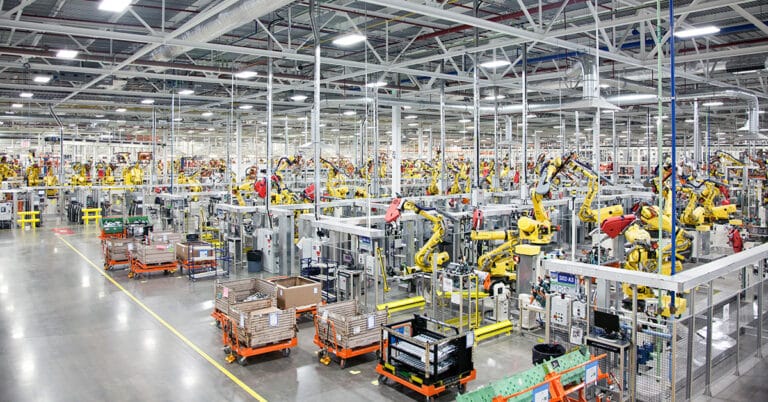From the early textile mills that dotted the landscape more than a century ago to the modern plants pumping out advanced wind turbines and more, manufacturing is in Charlotte’s blood. The city’s connections to the manufacturing sector have been crucial to its growth throughout the 20th century and beyond, and it’s in a great position to continue that trend.
Due to its strategic position on the East Coast, halfway between New York City and Miami, Charlotte has become one of the most important manufacturing hubs on the Atlantic. It also benefits from a strong pool of skilled workers as well as robust investments from within the city as well as outside of it. What follows is a brief overview of the current state of manufacturing in Charlotte, NC, as well as the challenges and opportunities that will have a hand in shaping its future.
Overview of Charlotte’s manufacturing industry
Employing more than 450,000 people and contributing more than $100 billion to the state’s economy each year, there’s no mistaking the strong presence of the manufacturing sector in North Carolina. On its own, Charlotte hosts more than 3,500 manufacturers who employ more than 146,000 workers, according to the Charlotte Regional Business Alliance.
Among the most important manufacturing sectors that currently call Charlotte home are the aerospace, automotive parts, pharmaceuticals, chemicals and food and beverage industries. These include some of the biggest names in domestic and international production, and the city continues to attract up-and-coming operations alongside established players. According to Site Selection Group’s 2024 Best States for Manufacturing rankings, North Carolina took the top spot among all 50 states. It’s easy to understand this when you consider all the major manufacturers who have set up shop in Charlotte over the years.
Largest manufacturing companies in Charlotte
Some of the biggest stars in the manufacturing firmament shine brightly in Charlotte, and their presence helps drive significant innovation and economic growth. Among some of the most prominent Charlotte, NC, manufacturing companies include:
- Siemens Energy: Focused on energy equipment and turbine production, Siemens’ operations in Charlotte no doubt receive a boost from the city’s proximity to major centers of learning like Duke University and UNC Chapel Hill.
- Honeywell: The company’s operations in Charlotte are built around the manufacturing of automation solutions as well as aerospace and industrial technologies.
- Coca-Cola Consolidated: Coke not only has a major beverage production operation based in Charlotte, but it also has a substantial presence in terms of its logistics.
- Sealed Air Corporation: With its advanced packaging solutions and sustainability innovations, Sealed Air Corporation is one of the biggest drivers of new ideas in the Charlotte manufacturing scene.
Key manufacturing trends influencing Charlotte
Given the city’s expansive manufacturing base and closeness to major centers of learning, it’s not surprising to learn that Charlotte is at the forefront of many of the biggest trends shaping the industry as a whole. In practically every regard, North Carolina manufacturing is guiding the leading edge of technology and techniques that will come to define the sector in the years to come. A few examples of the critical trends within the city’s manufacturing sector include:
- Advanced manufacturing: Technology plays a huge role in the manufacturing landscape in Charlotte, with automation, robotics and artificial intelligence all gaining a significant foothold. The rise of smart factories that require minimal or even no human intervention is another area where Charlotte is poised to take a leadership position.
- Sustainable manufacturing: As a city, Charlotte has made a commitment to sustainability, and the manufacturing sector is following suit. Companies throughout the metropolitan area have worked to use energy-efficient processes and reduce waste wherever possible.
- Workforce development and training: Charlotte Works is just one of the many organizations throughout the city committed to providing skills training and professional development to workers. This dedication is a big part of the reason why manufacturing in Charlotte has the skilled workforce that it does and is expected to continue driving growth in the area.
- Investment and infrastructure expansion: The city has undergone some serious transformations in recent years, as expansions of manufacturing plants in Charlotte, NC, and technology upgrades have given the city even more of an advantage over other markets. Fueled by a combination of private and government investment, the city’s growth is another major reason for its manufacturing success.
Challenges facing Charlotte manufacturers
Despite the relatively rosy outlook, that isn’t to say manufacturers don’t face the same challenges in Charlotte that others do elsewhere in the country. The strength and resiliency of Charlotte’s manufacturing industry are put to the test on a regular basis, as forces from all sides pressure manufacturers. Examples of the obstacles Charlotte manufacturers have to contend with include:
- Skills gaps and labor shortages: Capable workers are in high demand everywhere, and Charlotte is no exception.
- Supply chain and logistics challenges: In an increasingly global business world, disruptions around the world can be felt on a local level in Charlotte.
- Operational cost pressures: As the cost of practically everything rises, manufacturers in Charlotte are turning to strategies to optimize and streamline their operations so they can save money.
- Competition and market volatility: Other manufacturing hubs along the East Coast are always seeking to siphon operations away from successful communities like Charlotte. At the same time, fluctuating markets make it difficult for manufacturers to get their bearings.
Opportunities for Charlotte manufacturers
Even with these and many other challenges, Charlotte remains well-positioned to maintain its spot as one of the biggest manufacturing hubs in the eastern United States. The city has a number of competitive advantages that should give it enough of an edge to continue leading the pack, such as:
- Location: Charlotte’s centralized location and extensive multi-modal transportation networks are two of its most appealing qualities for manufacturers.
- State-level support and investment: North Carolina is one of the top states in the nation for manufacturing, thanks to incentives including tax breaks, grants and funding for workforce training.
- Emerging technologies: Its strong manufacturing base means Charlotte already has adopted technologies such as Industry 4.0, automation and digital transformation, giving it a head start over other markets.
- Export and market expansion opportunities: The increasing global demand for Charlotte-made goods is opening significant opportunities, paving the way for greater success in the future.
Future outlook for Charlotte’s manufacturing sector
As long as the city’s manufacturing base continues to adhere to the strategies and philosophies that made it a major hub, Charlotte should remain one of the biggest locations for the industry in the United States. As a leading provider of industrial maintenance expertise and solutions, ATS stands at the ready to help manufacturing operations throughout Charlotte adapt to changing conditions and make the most of their growth opportunities. To learn all about what we can do, reach out and speak with a member of our team today.






